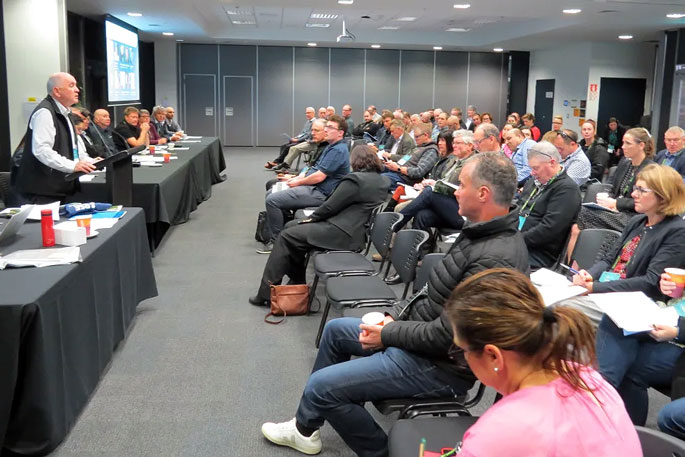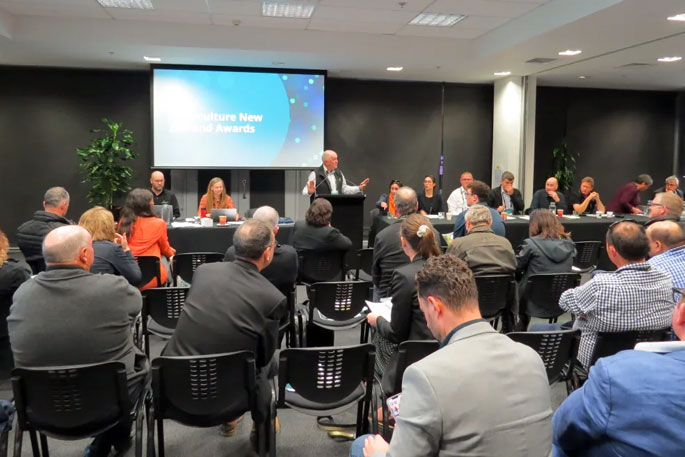Bay of Plenty hosted hundreds of horticulture leaders, growers and those from support sectors in Mount Maunganui for the Horticulture New Zealand and Recognised Employer Scheme conferences recently.
Set in the region with horticulture success stories like kiwifruit and avocados, the annual conference explored the challenges, triumphs and market conditions facing New Zealand's $7.48 billion industry.
Horticulture New Zealand AGM and results
Despite many growers facing low returns this year, industry group Horticulture New Zealand says its balance sheet is strong.
New figures show there are about 80,000 hectares of horticulture land in New Zealand, covering more than 100 types of fruit and vegetables. More than than 40,000 people are employed in the industry.
Horticulture New Zealand represents more than 4500 commercial vegetable and fruit growers, mostly funded through a commodity levy on the sale of fruit and vegetables.
It made $18.3 million in revenue in the year to March, up 36 per cent on last year.
Chairperson Barry O'Neil says the group has been conservative with spending, and it paid off.
"Our balance sheet is looking very favourable and positive," Barry says.
"We have purposely budgeted very conservatively. That has resulted in an outturn that is far more favourable than what we were expecting.
"We have pulled back on some of the activities that we would otherwise have undertaken, in light of the uncertainty with respect to the seasonal impacts that have happened and some of the pricing not being as favourable as in previous years."
 HortNZ Chair Barry O'Neil speaks at the AGM in Mount Maunganui on Friday. Photo: RNZ/Monique Steele.
HortNZ Chair Barry O'Neil speaks at the AGM in Mount Maunganui on Friday. Photo: RNZ/Monique Steele.
The board's not interested in spending money for the sake of it, he says.
"We have a number of what we think [are] high priority activities to focus on, including implementation of the Aotearoa Horticulture Action Plan."
It was agreed at the AGM that remuneration for the executive will increase 2.5 per cent for 2025. This will take the president's pay from $84,665 to $88,898.
Hort NZ spent $1.14m in remuneration for six executive officers, down two officers on last year.
The leadership is in for a switch later this year, as Nadine Tunley signs off as chief executive in mid-October when incoming boss Kate Scott takes the helm.
The levy rate will remain unchanged for 2025.
Horticulture New Zealand has commitments to six projects, including:
- SFFF A Lighter Touch - $100,000 per year for the next 3 years.
- Sustainable Vegetable System project - Vegetable Research & Innovation Board $15,000 over the next year.
- ACC Grow Home Safe project - $8,700 in the next year.
- Growing Change - $463,181 cash and $244,172 in-kind over the next 2 years.
- Cultural and Biological Control of Passionvine Hopper project - $259,750 over the next 2 years.
- Building Transformation Through Education: Tangata Whenua Capability Build in the food and fibre sector for $174,000 from 1 March 2024 to 9 December 2024.
Calls for a national food systems strategy
The horticulture sector is renewing calls for a national food strategy to improve food security for New Zealanders, to promote healthy fruit and vegetables and grow more of it here.
Speaking about how to better nourish Aotearoa, Horowhenua vegetable grower Jay Woodhaven says vegetable production is currently bound by unworkable regulations.
He says growers need rules that encouraged them to grow - and it must come from the top.
"The industry for a while now has been asking for nationally consistent, practice-based regulation that promotes sustainable and workable growing systems," says Jay.
"I think the most important part of this is that we get national recognition for fresh fruit and vegetable production and the important role that that plays in our domestic food system."
He says New Zealanders, growers and the environment will benefit from a national food strategy.
"The outcome of that is that we'll have a healthier environment, we'll have healthier people and we'll have a thriving vegetable production industry with growers able to work in a framework where they can go about what they love doing, which is growing healthy food and feeding that to New Zealanders at a reasonable price so that the health and wellbeing of our nation can continue to grow and prosper."
Food systems expert author Emily King says New Zealand as a whole must look at the bigger picture of food systems, because it needs to change.
She says with tamariki going hungry, high imports of low-nutrition foods and climate change affecting the environment, homegrown kai must be made affordable and accessible to all.
"If we had a national food system strategy that prioritised not only the growing of food and supported our farmers and growers, but also how we got access and health issues addressed, then we would be starting to really change the game and open up the conversation to improve our food system."
Bryan Smith of the Ministry for the Environment says land use allocation os at the heart of the issue, and the government has indicated that securing horticultural production for domestic supply is a priority.
And with the government having already repealed environmental legislation including the Natural and Built Environment Act and reviewing the National Policy Statement for Freshwater Management since coming into power last October, Smith said ministers were busy on policy development in the space.
"In the new government's announcements and coalition agreements, there is a specific manifesto commitment to looking at making fruit and vegetable production as a permitted activity, and ministers are working through those issues now, as well as re-balancing the National Policy Statement for Freshwater Management."
Marketing horticulture's sustainability without greenwashing
Fruit and vegetable growers have been told they can do a better job of telling the sustainability story of their produce to connect with eco-conscious and money-tight consumers.
At the conference, panellists discussed how to build trust with consumers during a cost of living crisis.
Kiwifruit marketer Zespri's global growth lead Tracey Armstrong says growers need to find their point of difference and connect that with the consumer.
"I think it's about ensuring that we deliver that value for our product. So what is your point of difference that you can put on your packaging."
Traceu says producers need to find the point of difference with their products and market it accordingly, as even though consumer spending was down, shoppers connected with attributes like high quality fruit and sustainable production.
"Even though consumers are tightening their purses and they've got less money to spend, they still want to buy that crunchy apple, they still want to buy that nutrient-dense blueberry because it's worth paying more for and it's going to deliver that quality."
Two years on from a season marred by poor fruit quality for Zespri in 2022, Tracey says for fruit, especially into international markets, good quality was key.
"If there's one message to impart, it's ensure that you carry on delivering that good quality because that's what's going to enable your product to stand out when times are tough."
Woolworths New Zealand's manager of sustainable sourcing Tami Schiefelbein says growers do so much good work to improve the environment, but often fell short on communicating that with consumers.
"You should probably be considering what the sustainability credentials of your products are and really telling that story," she says.
"I think already growers do such amazing things and every grower and farmer that I talk to in New Zealand is already usually implementing some sort of amazing practice."
But she says customers are very skeptical of greenwashing.
"So if you are going to try and make your product stand out during these challenging times, bring your customers on the journey, tell them the sustainability story, but make sure that you can back up everything you're saying with measurements and tangible facts that add credibility to what you're saying and add trust to your brand as well."
Pukekohe grower wins top award
LeaderBrand's sustainability manager Stuart Davis was awarded a top industry honour at a gala awards dinner on Thursday.
Stuart won the Bledisloe Cup for his contribution to the horticulture industry for more than 35 years.
He started his career with the Wattie's group, before moving to LeaderBrand in Gisborne, then Sutherland Produce before heading to Pukekohe and back with LeaderBrand.
Davis was championed for introducing science and innovation to enhancing sustainable vegetable production.
He'd been a director of industry group Vegetables NZ, chair of the Vegetable Research and Innovation Board and many other roles involved with pest and disease management.



0 comments
Leave a Comment
You must be logged in to make a comment.